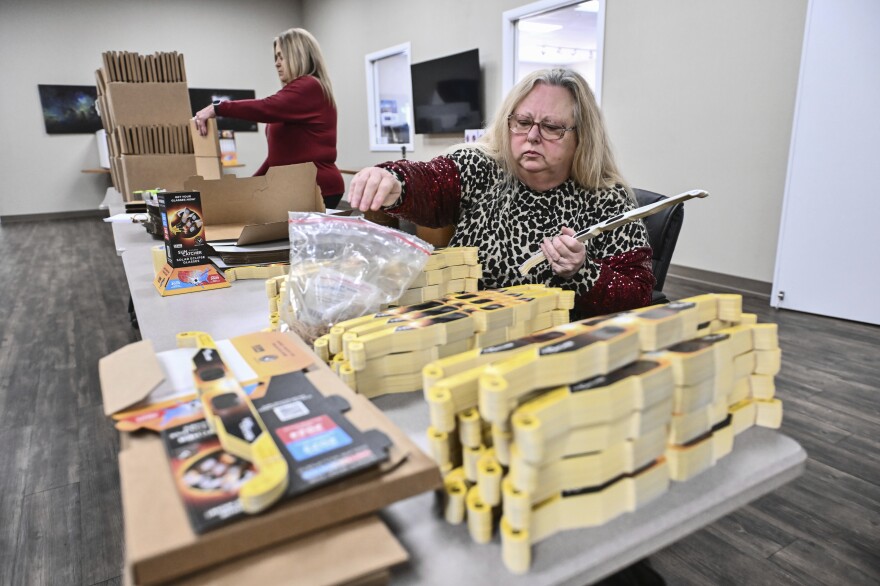Updated April 5, 2024 at 8:23 AM ET
The total solar eclipse is this Monday. If you're geeked to see it, you'll want to start getting prepared to do so safely.
One way would be to nab a pair of special solar eclipse glasses and to make sure they're the real deal.
Since it's been seven years since the last solar eclipse crossed the U.S., here's a refresher on all things eclipse glasses so you can view this celestial event without frying your eyeballs.
Remind me. What's the deal with this total eclipse?
A total solar eclipse — when the moon crosses directly in front of the daytime sun — will appear in the sky on April 8, 2024.
An estimated 31 million people live in the narrow strip of land stretching from Maine to Texas where people will be able to see the total eclipse — when the moon completely covers up the sun. Those outside this "path of totality" will see a partial eclipse, in which the moon blocks anywhere from a little bit to almost all of the sun.
NASA estimates that 99% of people living in the U.S. will be able to see a partial or total eclipse.
Precisely when you'll be able to see the eclipse — and what kind of eclipse you'll be able to see — will depend on your location and time zone.
Total solar eclipses are rare, and many people in the U.S. will have to wait more than two decades for another. The next total solar eclipse visible from the contiguous U.S. will be on Aug. 23, 2044.
Do I really need eclipse glasses?
If you plan to look directly at the eclipse, yes.
Proper eye protection must be worn throughout a total solar eclipse — except for the roughly 3 1/2 to 4 minutes when the moon fully obscures the sun, a brief period known as "totality." (You will need to take your glasses off during totality to actually see it.)
During the periods before and after totality — and during the entirety of a partial solar eclipse — eye protection is required.
Looking at the sun without proper eye protection for even a short time can harm your eyes and risk permanently damaging your retina, according to the American Academy of Ophthalmology.
Some people can even suffer blindness after looking directly at the sun, an affliction known as solar retinopathy.

Specialized eclipse glasses and hand-held solar viewers solve that problem. Their filters typically let through between 0.001% and 0.00005% of visible light, and they can be more than 1,000 times darker than ordinary sunglasses, the American Astronomical Society says.
Can I use something else to see the eclipse?
For sure. You can use a pinhole projector or camera obscura or even a colander to cast an image of the eclipse on the ground or a wall.
What you should not do is try to look at the eclipse through a telescope, binoculars or an unfiltered camera — even if you're wearing eclipse glasses.
And it bears repeating: Your regular sunglasses are not strong enough for eclipse viewing.
OK, I'm sold. Where can I get a pair?
There are plenty of eclipse glasses available for free or sale in person and online, but experts are urging people to source glasses carefully and beware of fakes.
Rick Fienberg, project manager of the AAS Solar Eclipse Task Force, says counterfeit eclipse glasses began appearing on the market just before the 2017 solar eclipse.
"[W]e didn't know who was making them, and we didn't know if they were safe," he told NPR via email.
The AAS issued a warning, and Amazon temporarily pulled some eclipse glasses from its website.
For this year's eclipse, Fienberg says, his group has had time to request testing information from many manufacturers. But he adds that some sellers of bogus eclipse glasses now fraudulently use the name or design of other companies.
There's a list on the AAS website of recommended eclipse glasses and other solar viewers that are made by reputable companies and safe when used properly.
Still, beware: Narrowing your choices to products that say they comply with the ISO 12312-2 international safety standard for eclipse glasses may not be enough, the AAS warns, since some vendors have falsely advertised that their untested glasses meet the standard. The AAS suggests avoiding buying products based solely on price from Amazon, eBay, Temu or other online marketplaces.
You may not have to do any shopping yourself, though. More than 13,000 public libraries across the U.S. are handing out 5 million eclipse glasses for free, so check with your local branch.
How can I make sure my eclipse glasses are legit?
The first thing to know is that you shouldn't test your eclipse glasses against the sun, just in case they're unsafe, according to NASA Goddard.
Instead, hold them up to a bright lamp or flashlight. The lit bulb should be invisible or very dim through the eclipse glasses, and you should not be able to see the glow around it.
"The way I like to think about it is if I put on the glasses and I can see anything that's not the sun, then they're not dark enough," Angela Speck, chair of the department of physics and astronomy at the University of Texas at San Antonio, told NPR. "That's a quick and dirty way to kind of judge it."
If you're planning to use an old pair of eclipse glasses, experts recommend checking to make sure they don't have any scratches or damage.
But if for some reason you can't get eclipse glasses before the big event, Speck suggests trying one of the other methods astronomers suggest for viewing the eclipse, like a projector.
"There are alternatives to looking through the glasses, and it would be a shame to miss this for fear of hurting your eyes," she said.
Nell Greenfieldboyce contributed reporting.
Copyright 2024 NPR. To see more, visit https://www.npr.org.



